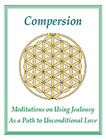
Did you notice the transformation in most retail store displays back in December from red and green to red… and more red? In February we are not so subtly reminded of Valentines Day and encouraged to purchase chocolates, roses, or a teddy bear for a loved one. Sometimes that teddy bear or edible underwear distracts us from an essential fact: expressing love for another is a beautiful part of being human and there are so many ways to do it. It does not require a special day or any particular reason to do it.
Now, I would like toinvite you to join me in a little shadow work by exploring the concept of jealousy. Anyone who has felt love for another person has most likely experienced jealousy. It can arise from insecurities, misunderstandings and cognitive distortions. Sometimes a minor bout of jealousy may awaken a sense of wanting to be closer to another person or deepen one’s understanding of the relationship. Jealousy, like fear, can be an instinctual response to a perceived threat. But, as with fear, if this Green-eyed Monster gets too powerful or shows up too frequently, there can be trouble for both the individual as well as the relationship.
So, now the first question is…What is the opposite of jealousy?
And the second question is…..How do we cultivate this emotional state?
The answer to the first question is:
The opposite of jealousy is Compersion
Another way of thinking of the opposite of jealousy is with the Buddhist concept of Sympathetic Joy or Mudita
And now let’s look at how to cultivate compersion…
Every person reading this has experienced this emotional state at some point in his/her life. If you’ve ever felt an instinctual “I am so happy for you!” on hearing about another’s good fortune, you know compersion. If your heart has ever leapt for joy when that suffering friend finally catches a break, then you’ve felt mudita. Our heart is excited to hear the news that someone we care about is celebrating something and as a result, we can celebrate it too. Compersion is as natural – and human – as jealousy.
But like most virtues, it deepens when we cultivate and practice it. Noticing when our own basic needs or wants are not met can be a first step. If we are not content with the way things are in our own lives, then it can be very challenging to extend heartfelt compersion to others.
Similarly, if we are constantly thinking that the only way to get our needs met is by serving ourselves and not others, then tapping into sympathetic joy can be difficult. This is why volunteering or helping others can be part of developing one’s ability to feel compersion. As in the Prayer of St. Francis (although historians seem to doubt that St. Francis wrote this back in the 13th Century):
“Grant that I may not so much seek
To be consoled as to console;
To be understood as to understand;
To be loved as to love.
For it is in giving that we receive…”
This prose gives us insight into ways to focus our energies on other’s well being so that it also has a positive impact on ourselves. It’s more than an idea that kindness is in our self-interest; believing in abundance and that all beings deserve to be free from suffering surely has freed many a practitioner from his or her own suffering.
Somehow it seems that the closer the person is to us the harder it may be to practice compersion. Maybe that is where the true challenge and reward lies. If our loved ones are close up mirrors of ourselves then wouldn’t it make sense to want to see them happy so that they can reflect back a happier image of ourselves?
And so how specifically might cultivating this evolved emotional state help advance one’s naked yoga practice? Well, for starters, I think of some of the feedback and questions I get especially from beginning students who say it’s hard to focus on one’s own practice when other people in the room have a ‘better’ practice or a ‘nicer’ butt or ‘bigger’ uh, water bottle. 🙂 Comparing ourselves to others can cause us to feel inferior or even envious of other which takes us further away from the compersion or sympathetic joy. So, the next time a ping of jealousy arises as a result of a thought, can you offer yourself some self-compassion followed by a self-talk comment such as “I am happy for that person that just kicked up into a beautiful handstand!” or after class approach the person and offer a comment such as “What a beautiful practice you have!” It’s a start but I bet it will help deepen your ability to feel compersion if you give it a try.
For more ways to practice compersion or mudita, check out this article!
When you take a glance in that mirror, you might see that, while you look all right in GREEN, the color of COMPERSION looks absolutely stunning on you and IN you! And once you get used to seeing yourself in the mirror with the color of compersion, I know you will see an even more beautiful naked being standing there smiling back at you, too!
“Give what you have. To someone, it may be better than you dare to think.”
― Henry Wadsworth Longfellow
Compersionally yours,
Ken


No comments yet.